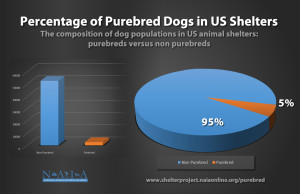 Shelter & Rescue
Shelter & Rescue  No Comments
No Comments Genetic Breed Testing of Shelter Dogs Counters Commonly-Repeated Myth
HSUS and other fundraising groups have repeated the mantra that “25% of dogs in shelters are purebreds” for so long, it has become a commonly accepted truth. Because the statement never matched up with the experiences of our board members, volunteers, and supporters who work in shelters, we felt the need to investigate the issue. This led to our 2015 survey, which found that the number of purebred dogs in shelters is closer to 5% (5.04%).
This week, another study on shelter dog populations was released out of Arizona State: A canine identity crisis: Genetic breed heritagetesting of shelter dogs, and its findings were quite interesting (emphasis ours):
We found that over 100 breed signatures were identified at each shelter in our genetic breed testing with over 91 breeds shared between sites. Breed ancestries ranged from having one to five unique breed signatures identified (7%). On average, purebreds represented less than 5% of dogs tested with individuals most often having three breed signatures identified within their genetic heritage. In order of prevalence at AAWL and SDHS, American Staffordshire Terrier, Chihuahua, and Poodle were the most common breeds identified.
This is a thorough and well-written study in its own right, but what is so fascinating and valuable about this to us is that two different groups, using different methodologies came to nearly identical conclusions. Finding solutions to the issues facing pets and animal lovers becomes much easier when we know the truth of what we are dealing with.


